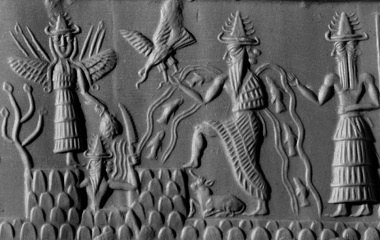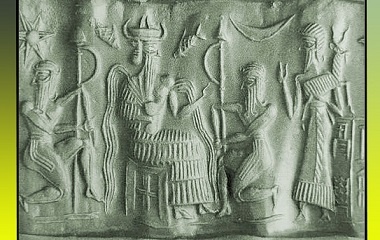- Pronunciation: en-kee
- Origin: Sumerian
- Role: God of water, fertility, trickery, magic and wisdom
- Symbols: A scepter with a goat’s head, a fish, a goat
- Parents: Anu, Nammu
- Wife: Ninhursag
Who Is Enki?
The Sumerian god’s name means Lord of the Earth. Enki is also known as Ea in Babylonian and Akkadian mythology. Together with Anu and Enlil, he is one of the three key gods in the Mesopotamian pantheon. Though his vast appetite for sexual conquest may bring his mores into question, he was very compassionate in nature. His desire to nurture humans and favor their side over the gods, as well as a tendency towards solving rather than starting conflicts, balanced out his lustful deviance.
Origin
Enki was originally the patron god of the city of Eridu. Eridu was believed to be the first city ever created, according to ancient Sumerian beliefs. Though he is first noted as an Akkadian god, from around 2600 – 2350 BC, shrines to Enki have been found which date back to 5400 BC! In the Enuma Elish, the Babylonian creation myth found on ancient tablets and dating to approximately 1100 BC, the universe was originally in a state of chaos. The chaos separated into fresh water, the male principle called Apsu, and salt water, the female principle called Tiamat. Apsu and Tiamat were the first gods and gave birth to Enki, their eldest child.
Legends and Stories
Enki is portrayed as a loving and caring god who uses his wisdom to find the best solution in every situation. Perhaps he was one of the first to fit the now commonplace label of a lover not a fighter.
The Atrahasis
Akkadian/Babylonian mythology states the younger gods were made to do all the work to maintain creation, and grew tired of the daily grind. Not unlike some of the youth of today, they sought a way out of the hard work. As a result, they created other beings to do the work for them: humans. The humans were forged from the sacrifice of one of the younger gods. At first, they created only seven female and seven male humans, but due to their incredible fertility, their numbers soon grew into the hundreds. The larger their number, the noisier they grew. The gods became angered by humankind’s rowdy nature and their population explosion and sought to reduce their numbers. The main instigator of humankind’s extinction was the god Enlil. He tried to eradicate the humans firstly by drought and then by plague, but his plans were continually undermined by Enki.
When Enlil decided to send a great flood, Enki once again took pity on the humans and ensured that one man was made aware of the impending cataclysmic disaster. He relayed the message to a man named Atrahasis, through a reed wall, and instructed him to build a boat. The boat had to house his family as well as two of every kind of animal. Atrahasis built the boat, and when the flood ensued, those aboard were the only humans to survive. Enlil found out it was once again Enki who came to the humans’ aid and sought vengeance on him. Enki convinced Enlil that the man he saved was a righteous man and didn’t deserve to be punished for the sins of his fellow humans. When Atrahasis offered a sacrifice to the gods, the gods were appeased. Enlil was only satisfied, however, when Enki declared humans would no longer live as long as they had and women would not be as fertile as they had once been.
Enki and Inanna
In the myth of Enki and Inanna, Enki was the possessor of the rules of civilization called the meh. At a feast, he tried to get his daughter, Inanna, drunk on beer so he could seduce her. She did not submit to him though and instead, Enki became very intoxicated. In his drunken state, he gave Inanna a gift of the meh. He only realized in the morning the meh was gone and sent demons after Inanna to retrieve it, but she managed to evade them easily and got away. The god was once again thinking of humanity’s needs, as he knew Inanna would give the gift of civilization to them.
Family
Enki and Ninhursag had four children: Marduk, Enbilulu, Asarluhi and the sage Adapa.
Enki, who was also the god of semen, had numerous incestuous affairs, which he ascribed to his insatiable love for his wife. He and Ninhursag had a daughter called Ninsar, who grew to be a woman in only nine days. In his wife’s absence, Enki mistook the girl for Ninhursag and seduced her. A daughter named Ninkurra was born from their union. After Ninkurra also developed into a woman in a matter of days, the same thing occurred. Ninkurra later gave birth to a daughter named Uttu. When Ninhursag heard about her husband’s actions, she cursed him and he became gravely ill. Only she could save him. The only way to heal him was for her to give birth to a further eight children: Nanse, Abu, Ninsitu, Nintulla, Azimua, Ninkasi, Ninti and Emshag.
Appearance
Enki is depicted as a bearded man dressed in long robes and a horned cap. Streams containing fish run from his shoulders, indicating his association with water and its life-giving properties. One river is said to be the Tigris, and the other, the Euphrates. The trees included in the iconography represent the male and female principles in nature.
Modern Influence
Though Enki shrines have been discovered in Eridu, his cult following stretched to Assyria and Babylonia. He was worshiped at his temples in Eridu, called the E-engur-ra (House of the Subterranean Waters) and E-abzu (House of the Abzu). Though no services, as we know them today, were held at the temples, they did provide healing, distribution, and counseling to the people. Eridu was a revered religious city and analogous to the Hebrew Garden of Eden.
In the Sumerian tales of Enki, Ninhursag was depicted as his equal, reflecting the gender equality of the pre-patriarchal society at that time. Later, taken in an Assyrian and Babylonian context, she is relegated to a lesser position, as many female deities were lowered in status with the accepted patriarchal view.
The water god may also have influenced other cultures and religions. The freshwater pool outside Enki’s temples was possibly adopted later by Middle Eastern cultures and may be the equivalent of the sacred fountain or pool found at some mosques, or the Christian receptacle used in baptism.











The Battle of the Eagle & the Serpent continues. Praise due to the King Enki and Marduk. Knowledge Love & perseverance
The God of the waters and Earth, the God of wisdom the God of magic, the God of the semen, the God of agriculture, the God of animal husbandry, the God of music, arts and the crafts. The Christ and the Messiah, the God of knowledge and civilization.
Hail Enki
I wish to set up a Temple dedicated to Lord Enki, the Almighty Ptah.
Can any devout one provide me with more information and guidance?
My Physical Address is: 63-5539, Zirconium close, EXT 8, ENNERDALE, 1830-SOUTH AFRICA